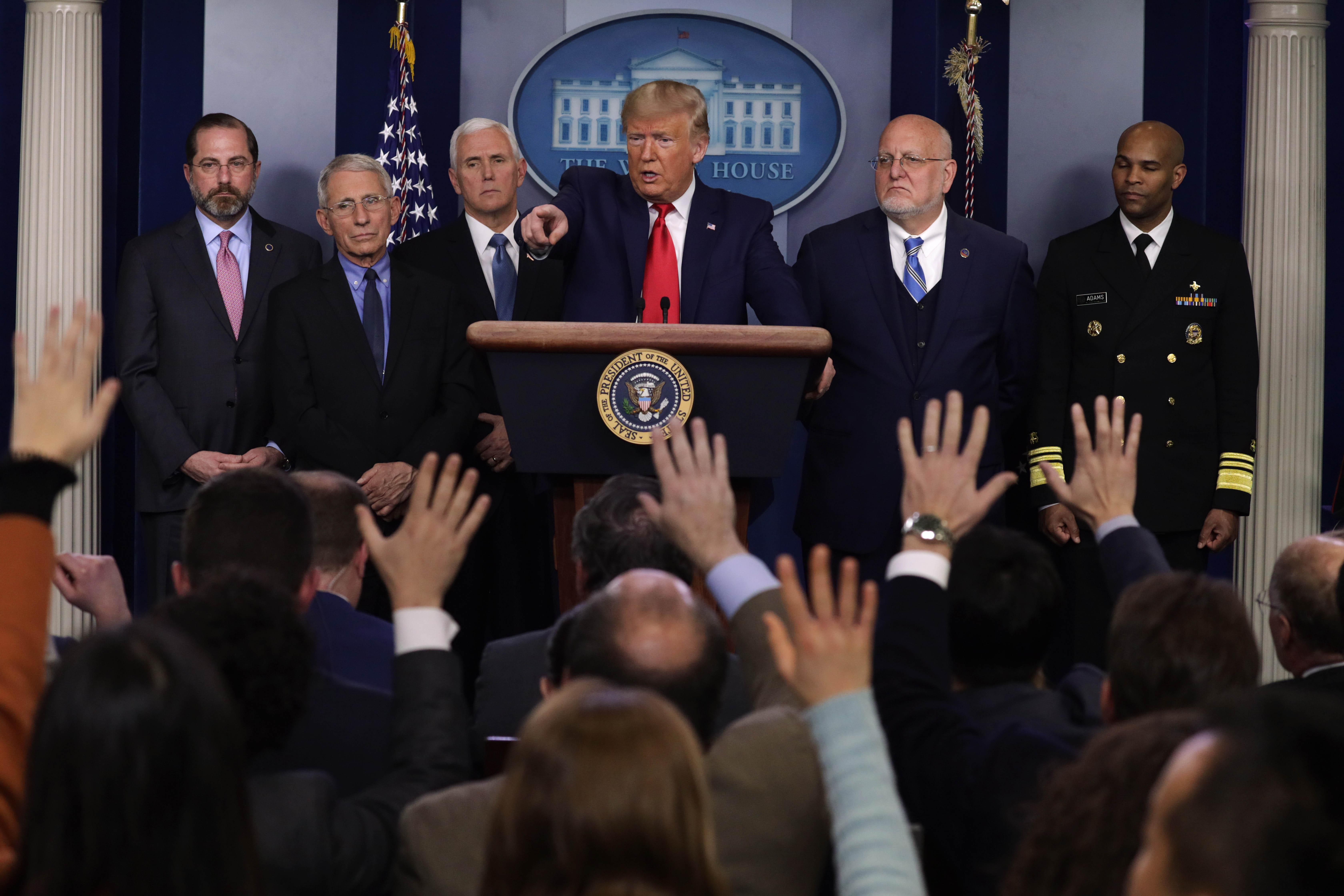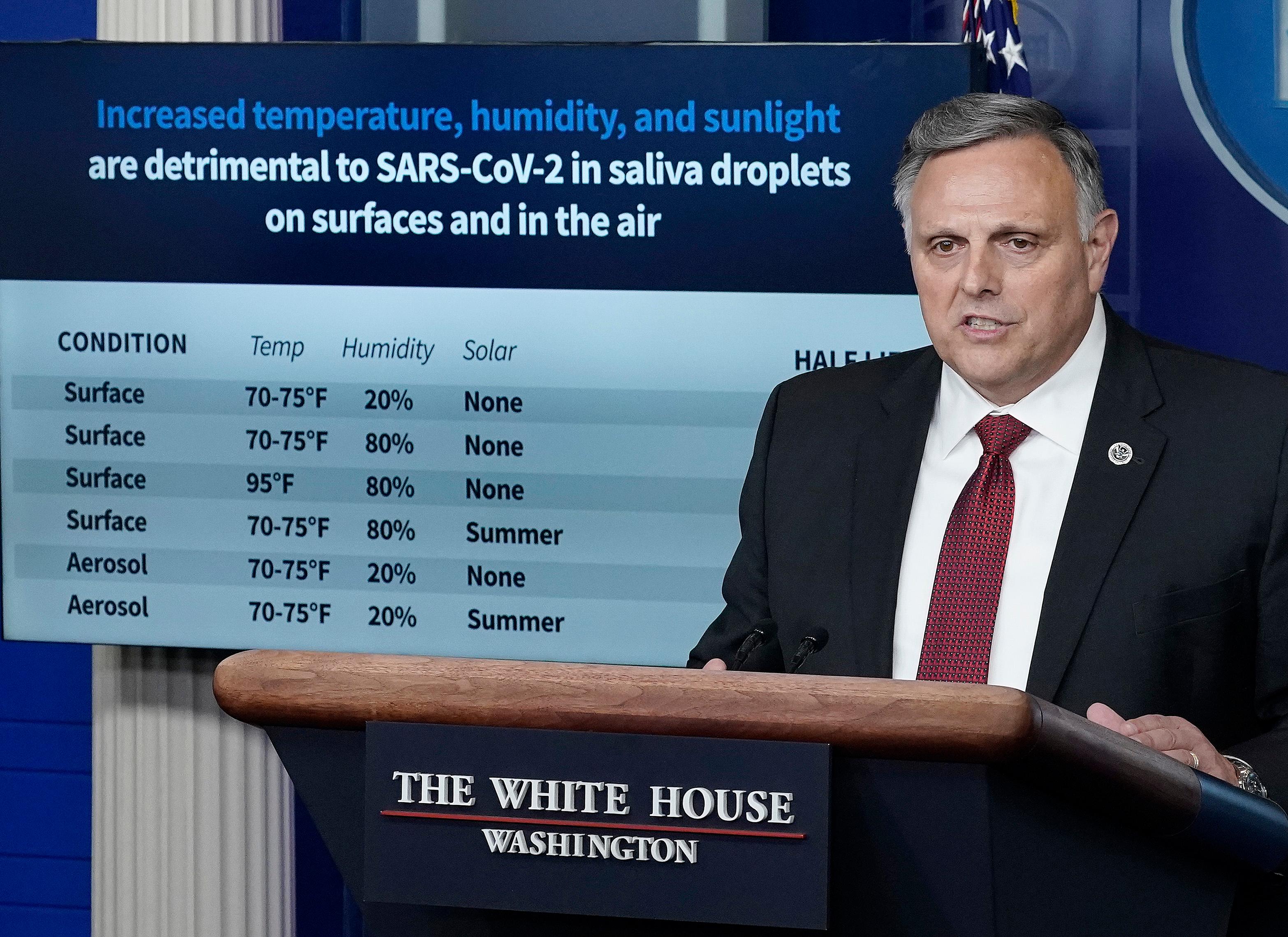
Trump suggests injecting disinfectant as possible treatment for COVID-19
By Mark PygasApril 25 2020, Updated 7:35 p.m. ET
President Donald Trump has promoted unproven medicines as treatments for COVID-19 throughout the coronavirus pandemic. Hydroxychloroquine, an anti-malaria medicine, was hyped by Trump, and as a result, Fox News, until a report from trials of the drugs showed that it was ineffective.
“It’s a very strong, powerful medicine. But it doesn’t kill people,” Trump told reporters of hydroxychloroquine on 5 April. “We have some very good results and some very good tests. What really do we have to lose?”
Following the report, Trump said: “Obviously there have been some very good reports. Perhaps this one’s not a good report, but we’ll be looking at it.”

But now, President Trump seems to have suggested research into a downright dangerous treatment - injecting disinfectant.
During Thursday's briefing, an official presented results from a government study that suggested coronavirus weakens when exposed to sunlight and heat. The expert also confirmed that bleach could kill the virus in saliva or respiratory fluids within five minutes. Isopropyl alcohol could kill it even more quickly.
Of course, these disinfectants are so potent that it can kill just about anything. William Bryan, acting head of the US Department of Homeland Security's Science and Technology Directorate, had intended Americans to use it to clean surfaces that may have been exposed to coronavirus.
But President Donald Trump seemed to suggest that injecting these disinfectants could be a possible treatment.

"So, supposing we hit the body with a tremendous - whether it's ultraviolet or just very powerful light," the president said, turning to Dr. Deborah Birx and Bryan, "and I think you said that hasn't been checked, but you're going to test it."
He continued: "And then I said, supposing you brought the light inside of the body, which you can do either through the skin or in some other way. And I think you said you're going to test that too."
The President then added: "And then I see the disinfectant where it knocks it out in a minute. One minute. And is there a way we can do something like that, by injection inside or almost a cleaning? Because you see it gets in the lungs and it does a tremendous number on the lungs. So it'd be interesting to check that. So you're going to have to use medical doctors."
Going back to using light and heat to treat coronavirus and pointing to his head, President Trump remarked: "Again, I say maybe you can, maybe you can't? I'm not a doctor. But I'm, like, a person that has a good you-know-what."
Turning to Dr. Birx again, Trump asked if she had ever heard of using "the heat and the light" to treat coronavirus.
"Not as a treatment," Dr. Birx said. "I mean, certainly, fever is a good thing. When you have a fever, it helps your body respond. But I've not seen heat or light."
"I think it's a great thing to look at," Trump concluded.
Phil Rucker of the Washington Post interjected: "Respectively sir, you're the president and people tuning into these briefings, they want to get information and guidance and want to know what to do, they are not looking for rumors."
To which Trump responded: "Hey, Phil, I'm the President and you're fake news."
When he was later asked about cleaners like bleach and isopropyl alcohol being injected into a person, Trump appeared to backtrack on his suggestions, stating: “It wouldn’t be through injection. We’re talking about through almost a cleaning, sterilization of an area.”
Following the comments, Lysol and Dettol maker Reckitt Benckiser Plc stated that “under no circumstance” should their range of disinfectants be administered to the human body.
“As with all products, our disinfectant and hygiene products should only be used as intended and in line with usage guidelines,” Reckitt added.
Following Trump's comments, Lysol began trending on Twitter. Many of the comments were from experts telling people NOT to put disinfectants in their bodies.
"These things destroy viruses, but they also destroy the cells and organs that you might need in order to live, breathe, and not get cancer," Jen Heemstra, an associate professor at Emory University wrote.
Jonathan Spicer, medical director of the McGill Thoracic Oncology Program, pointed out that one of his patients had already attempted to ingest Lysol to prevent coronavirus infection.
While another added: "If you are wondering who needs the warning labels on Lysol cans to not ingest, the President of the United States, apparently."
Another user added: "Don't inject Lysol or Clorox inside your body. This is a sentence I had to type out. "
One user even showed us what bleach does to human blood under a microscope.
So yeah, please don't do that.
The best way to prevent contracting or spreading coronavirus is with thorough hand washing and social distancing. If you feel you may be experiencing symptoms of coronavirus, which include persistent cough (usually dry), fever, shortness of breath, and fatigue, please call your doctor before going to get tested. For comprehensive resources and updates, visit the CDC website. If you are experiencing anxiety about the virus, seek out mental health support from your provider or visit NAMI.org.
